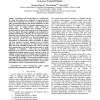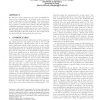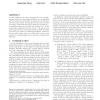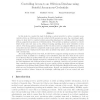SAC
2010
ACM
15 years 1 months ago
2010
ACM
Complex organizations need to establish access control policies in order to manage access to restricted resources. Role Based Access Control paradigm has been introduced in ’90 ...
IEEEARES
2010
IEEE
15 years 1 months ago
2010
IEEE
—Managing access control policies is a complex task. We argue that much of the complexity is unnecessary and mostly due to historical reasons. There are number of legacy policy s...
TLDI
2010
ACM
15 years 3 months ago
2010
ACM
We propose a programming language, called PCML5, for building distributed applications with distributed access control. Target applications include web-based systems in which prog...
PERCOM
2006
ACM
15 years 6 months ago
2006
ACM
In this paper we present a new framework for specifying access control policies in smart spaces called Criticality-Aware Access Control (CAAC). The main idea is to automatically r...
ICSE
2007
IEEE-ACM
15 years 6 months ago
2007
IEEE-ACM
Policy testing and analysis are important techniques for high assurance of correct specification of access control policies. We propose a set of testing and analysis techniques fo...
EDBT
2008
ACM
15 years 6 months ago
2008
ACM
We introduce a fine grained access control mechanism for Peer-to-Peer collaborations. It is based on the local access control components of the participants. The peers export thei...
127
click to vote
SIGMOD
2005
ACM
15 years 6 months ago
2005
ACM
In data publishing, the owner delegates the role of satisfying user queries to a third-party publisher. As the publisher may be untrusted or susceptible to attacks, it could produ...
PKC
2009
Springer
15 years 7 months ago
2009
Springer
In this work, we consider the task of allowing a content provider to enforce complex access control policies on oblivious protocols conducted with anonymous users. As our primary ...
CCS
2009
ACM
15 years 7 months ago
2009
ACM
This paper proposes a D-algebra to compose decisions from multiple access control policies. Compared to other algebrabased approaches aimed at policy composition, D-algebra is the...
WWW
2007
ACM
15 years 7 months ago
2007
ACM
To increase confidence in the correctness of specified policies, policy developers can conduct policy testing by supplying typical test inputs (requests) and subsequently checking...




